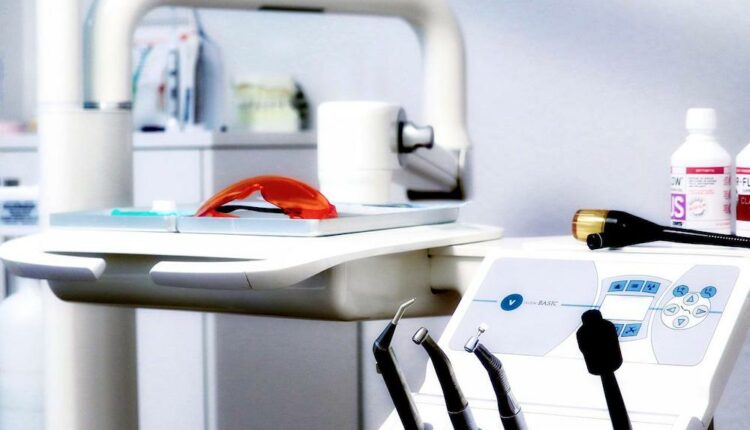Attracted by unbeatable prices, fast turnaround times and the promise of a bright smile, 150,000 to 250,000 foreign patients will travel to Turkey for treatment this year. But failures are not uncommon.

At 42, Rida Azeem now lives with dentures. Coming to Istanbul in June 2021 for dental treatment, the Briton left with her mouth ravaged. “They ruined my face”, she says, videos and medical report in support. The disappointment was immediate: “I lowered my mask and my husband said to me “but what did they do to you? “. I had holes in my gums and you could see the metal rods” of the implants, told AFP this engineer with long black hair from Manchester. “Initially, they were going to put five implants in me, but [on the day of the procedure] the doctors told me ‘we have to extract all your teeth,'” she explains, regretting having been convinced by doctors who “seemed professional”.
Attracted by unbeatable prices, fast turnaround times and the promise of a bright smile, 1,500,000 to 2,500,000 foreign patients will travel to Turkey for treatment this year, according to the Association of Turkish Dentists (TDB), making the country l one of the main destinations for dental tourism in the world, alongside Hungary, Thailand and Dubai. But the “Hollywood smile” sold by clinics in Istanbul, Izmir or Antalya often involves trimming – even extracting healthy teeth, sometimes all of them.
“A lot of Turkish clinics treat teeth that don’t need it. They put veneers or crowns where whitening would have sufficed, ”slips the boss of a dental clinic in Istanbul on condition of anonymity.
“Pains Every Day”
Failures are not uncommon: in addition to Rida Azeem, AFP was able to collect the testimonies of five foreign patients who suffered serious complications.
Among them, Alana Boone, 23-year-old Belgian, came to have 28 crowns laid in Antalya in July 2021. The work seems successful. In appearance only: “The crowns are placed too deeply. I have inflammation and pain every day, sometimes very intense, ”she explains fourteen months and a complaint later. “The only solution would be to remove everything, but the dentists don’t know what they will find. »
Marie, a French nurse, wanted to have crowns placed on her lower teeth: “I had just separated, I wanted to be more attractive”. In Turkey, a dentist convinces her, for a uniform smile, to have prostheses placed on her upper teeth as well. 28 crowns in total. “I had very healthy teeth. I started to regret when they started filing them. “After a month, the troubles started: loose teeth, interstices, stuck food debris… No matter how much I put mouthwash, my breath is pestilential,” the 50-year-old said a year later.
“It is mutilation! »
The phenomenon is worrying in the United Kingdom: the British Dental Association (BDA) warned in mid-July of the “considerable risks” of carrying out “reduced cost treatments” abroad, citing cases of infections and “ill-fitting crowns and implants having come loose”. Patrick Solera, president of the Federation of Liberal Dental Unions (FSDL), judges the phenomenon still “restricted” in France but is worried to see influencers “going to have their teeth cut” in Turkey. “You don’t make a crown on a slightly yellow tooth. Cutting a healthy tooth to put a crown on is mutilation. In France, it is punishable by imprisonment! he thunders.
“These are people’s expectations,” retorted Tarik Ismen, president of the Association of Turkish Dentists, interviewed by AFP “Some want to look like Hollywood stars or have a fluorescent mouth. This demand exists and if the Turkish dentists do not respond to it, the Albanians or the Poles will”. The doctor recognizes failures – “3 to 5% of errors is acceptable” – but affirms that “it can happen anywhere”. Also, he points out, none of the 40,000 dentists in his association have been struck off.
“Turkish dentists are the best and the cheapest in the world,” agrees Dr. Türker Sandalli, the first, twenty years ago, to have had the idea of developing dental tourism in Turkey. In the corridor of his Istanbul clinic with walls covered with diplomas and awards, where 99% of patients are foreigners, the septuagenarian is pleased that “no tooth has been pulled in twelve years” by his team. “But, and it pains me to say it, 90% of clinics are low-end,” he laments, accusing “2,000 to 3,000” illegal structures of smearing the profession.
Berna Aytaç, president of the Istanbul Chamber of Dentists, accuses the medical tourism agencies that abound in Turkey of “dragging the quality of care down”. Almost all of the foreign patients interviewed by AFP went through these intermediaries who offer formulas including transport, accommodation and care, whether dental treatment, hair implants or cosmetic surgery operations.
More than 450 medical tourism agencies are licensed by the Turkish Ministry of Health. But, as AFP has seen, some use deceptive or misleading processes. Among these is Sule Dental, 390,000 subscribers on Instagram, where it presents itself as a “dental practice” – although only having an approval as an “intermediate body”. On the home page of its website, Sule Dental displays large photos and comments from four ex-patients with dazzling smiles. A woman congratulates the “EXTRAORDINARY team” of Sule Dental, another thanks her “benevolent” dentists.
AFP has verified: these photos come from image banks. The same shots are also used on a website advertising Perla Dental, a clinic in Antalya… and on that of a Tunisian medical agency.
On Instagram, Sule Dental also publishes videos of ex-patients praising its merits; among them, two Britons who had veneers installed told AFP that they had experienced complications.
“Another dentist saw that my root canal was damaged. I was bleeding a lot when I brushed my teeth,” said one, requesting anonymity. This influencer, who came to Turkey as part of a partnership, did not inform his tens of thousands of subscribers, for fear of exposing himself to legal proceedings. Contacted by AFP, Sule Dental and the Turkish Ministry of Health did not respond on Tuesday.
“Too scared to go back”
For the victims, the remedies are thin or costly once they return home. “When a patient returns from Turkey or elsewhere with work done, we refuse to touch it because we become responsible,” warns Patrick Solera. To repair the damage, Rida Azeem and Alana Boone were offered quotes of around 30,000 dollars, three to four times the sums they paid in Turkey.
By dint of perseverance, the Briton says she recovered $3,000 from her Istanbul clinic – a sum that allowed her to have dentures made in Pakistan and recover “90%” of her smile. The Turkish practitioner offered her to come back: “I was too scared to go back,” she says. Contacted by AFP, the clinic did not respond. “If you want treatment, find your doctor yourself, talk to him directly and don’t leave without even an online consultation,” warns Burcu Holmgren, of London Legal International.
The London-based Turkish lawyer says she has defended more than a dozen patients who suffered complications after dental treatment in Turkey. “The procedure is very slow: it takes about two years for the case to succeed,” she said, claiming, however, to have “won 96%” of her cases. Most deals end with a financial deal — with no dentists being written off, she concedes.
In Istanbul, the president of the Chamber of Dentists continues to believe in medical tourism, but is worried about the number of students ready to flood the profession.
In 2010, the country had 35 faculties of dental surgery. Today there are 104. “We are creating future unemployed people,” fears Ms. Aytaç. “If they don’t find work, some will unfortunately turn a blind eye to ethics. »
